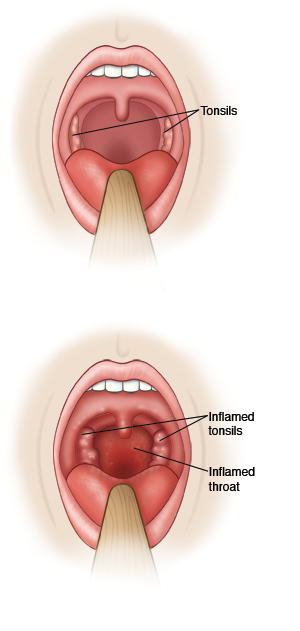You have pharyngitis (sore throat). The health care provider may think your sore throat is caused by a bacteria called Group A streptococcus (strep). This is often called strep throat. It is diagnosed by either a rapid strep test, which gives immediate results, or a throat culture, or both. Strep throat can cause throat pain that is worse when swallowing, aching all over, headache, swollen lymph nodes or glands in the neck, and fever. The infection is contagious. It often spreads by coughing, kissing, or touching others after touching your mouth or nose. An antibiotic is given to treat the infection. Antibiotics are prescribed by health care providers to treat bacterial infections, not viral infections.
Home care
-
Rest at home. Drink plenty of fluids so you won’t get dehydrated.
-
Stay home from work or school for the first 24 hours of taking the antibiotics, or as directed by the health care provider. After this time, you won't be contagious. You can then return to work or school if you are feeling better, or as directed by the provider.
-
Take the antibiotic medicine until it's gone, or as advised by the provider, even when you feel better. This is very important to make sure the infection is fully treated. It's also important to prevent medicine-resistant germs from growing. If you were given an antibiotic shot, your provider will tell you if more antibiotics are needed.
-
You may use acetaminophen or ibuprofen to control pain or fever, unless another medicine was prescribed for this. If you have chronic liver or kidney disease or ever had a stomach ulcer or gastrointestinal bleeding, talk with your provider before using these medicines.
-
Use throat lozenges or a throat-numbing spray to help reduce throat pain. Gargling with warm saltwater can also help reduce throat pain. Dissolve 1/2 teaspoon of salt in 1 glass of warm water.
-
Don’t eat salty or spicy foods. These can irritate the throat.
Follow-up care
Follow up with your health care provider or our staff if you don't feel better in 48 hours, or as directed.
When to get medical advice
Contact your health care provider right away if you have:
-
A fever of 100.4°F (38°C) or higher, or as advised by your provider.
-
New or worse ear pain, sinus pain, or headache.
-
Painful lumps in the back of neck.
-
Stiff neck.
-
Lymph nodes that get larger or neck swelling.
-
Can’t open mouth wide due to throat pain.
-
Signs of fluid loss (dehydration), such as very dark urine or no urine, sunken eyes, dizziness.
-
Noisy breathing.
-
Muffled voice.
-
New rash.
-
Symptoms that get worse.
-
New symptoms that develop.
Call 911
Call
-
Can't swallow, especially saliva, with a lot of drooling.
-
Have trouble breathing or wheezing.
-
Feel faint.
-
Can't talk.
-
Have a feeling of doom.
Prevention
Here are steps you can take to help prevent an infection:
-
Keep good handwashing habits.
-
Don’t have close contact with people who have sore throats, colds, or other upper respiratory infections.
-
Don’t smoke, and stay away from secondhand smoke.
-
Stay up to date with all of your vaccines.


